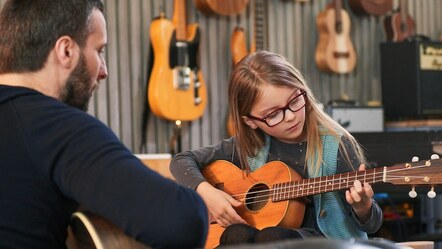New York, NY (Top40 Charts) Private lessons have been a core of music education for centuries, and it is one of the few remaining examples of common mentorship in any profession. But musicians at all levels, as for an
essay writer site, continue to teach and to take private lessons, from beginners to world-class professionals. Some musicians teach as one among many activities in their professional scope; others teach full time. Here are some of the essential considerations for setting up a private teaching practice.
Policies
Before you begin, develop your policies for attendance, payment, and so on. Many teachers prefer to set up advance monthly or semesterly auto-payments rather than collect checks every lesson, to avoid difficult situations when students cancel at the last moment.
Business Organization
A private lessons studio is an entrepreneurial endeavor. As such, you need the right corporate setup, accounting practices, insurance, payroll, and so on, similar to any small business. What's best will depend on several factors, such as if you hire any staff or other teachers, etc., so consult your financial adviser.
Facility
Where will you teach? It might be at your house, your students’ houses, at a music store, at a school, at your own commercial space, or increasingly, via Skype or another online service. There are benefits to having your own dedicated space for teaching, as opposed to being an itinerant. You can have access to your library of books, sheet music, and recordings; you can have recording equipment always ready to go; you can have supplies such as manuscript paper, extra strings/reeds/oil, always on hand; and if your student stands you up, you are in your own space and can be productive. Architecture is important, as the teaching space needs to be free from interruptions and extraneous noise, and the noise you make shouldn’t be annoying to others. There should ideally be a waiting area outside the teaching area, where parents or the next session’s student can wait while you finish up. A restroom accessible to that space can prevent lesson interruptions.
Gear
Teachers and students need music stands and chairs. Recording equipment is helpful—even if it’s just a simple Zoom recorder. Also, have on-hand a metronome and for some instrument studios, an electronic tuner. A drum machine could be helpful, as could a piano/keyboard for accompaniment, or extra instruments. Smartphone or tablet apps might suffice for many of these tools. But hardware supplies such as extra batteries, strings, rosin, oil/grease, drinking water, and so on can help avoid interrupted or truncated lessons.
Curriculum
Understanding the level of your students will help you develop a curriculum that makes sense, and this is a journey beyond the scope of this article. However, know that music publishers such as Hal Leonard Corp. and Berklee Press sometimes provide special materials or free "desk copies" of products for teachers. A common misconception is that teachers need to develop their curricula from scratch, but there is a tremendous amount of material available. Common types of supporting materials for music lessons are method books for teaching new ideas, sheet music/songbooks for developing repertoire and sight-reading, and exercise books reinforcing new concepts and building techniques/facilities.
Finding Students
Where will your students come from? You can advertise/network through music stores, schools, music educator associations, and online services such as Craigslist. Students often come from referrals, so offering programs to existing students such as sibling discounts or referral payments can help develop your clientele. First stop: develop a website that clearly explains what you do and what your qualifications are. Make sure it is easy for Google to find you. Some sample websites from music studios around the world are listed at the end of this article. Also, develop a presence on all the common social media outlets, particularly Facebook, LinkedIn, Twitter, and Pinterest.
Special Events
Many teachers host regular recitals for their students, either for exclusively the students themselves or for their families as well. This gives the students to perform in public and also is a good way to help them set goals. Masterclasses and offsite multi-day retreats for groups of students are additional teaching possibilities that can command additional sources of income and teaching opportunities. You can bring in special guests to lead all or part of these events, expose your students to related topical areas, and enrich their overall experience. A vocal teacher, for example, could host a songwriter to present a master class for his or her students.
Other Student Services
Beyond usual lessons, you can offer special mentorship activities such as helping someone buy a new instrument, preparing for special auditions or concerts, coaching their bands/ensembles, or recording an album. Some teachers develop skills in instrument repair. Developing a network of teachers and other music professionals can create a mutually beneficial system of referrals; a guitar teacher sends students to a guitar tech, who refers clients back to the teacher.
Auxiliary Sales
Besides offering lessons, teachers can provide supplies and other services, which serve to bring in additional income, avoid potential interruptions during lessons, and maintain a level of control over the products used by the students. Consider directly selling books, strings, other consumable instrument-related products, and possibly instruments. Publishers and manufacturers often set up dealer accounts with private instructors, offering their wares at a discount.
Your Mentor(s)
Periodically, take lessons in your area of focus, both to keep your skills sharp/evolving and to learn about how others approach providing this service. If you are interested in learning about how to deliver a music lesson via Skype, several of the studios at the end of this article provide that service, so you might try them out if only to see what it’s like. Learning new skills could help you become qualified to teach a wider spectrum of students, such as those interested in music outside your current comfort zone, or on instruments a sideways step away from what you ordinarily play (e.g., guitarists might study electric bass, or saxophonists might study clarinet).
Beyond being one of a musician’s steadier sources of income, teaching is a way for us to learn more about our art. We reinforce our understanding by explaining it to others, and that we learn as much from our students as they learn from us is a common refrain spoken by many veteran teachers. It is part of our tradition and a key way that the wisdom of our predecessors gets passed along to other musicians. A worthy endeavor, and hopefully, a lucrative one for you.
























